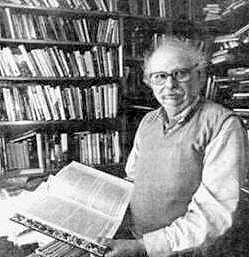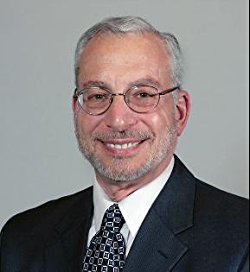
Abraham Joshua Heschel was a Polish-American rabbi and one of the leading Jewish theologians and Jewish philosophers of the 20th century. Heschel, a professor of Jewish mysticism at the Jewish Theological Seminary of America, authored a number of widely read books on Jewish philosophy and was a leader in the civil rights movement.

Judaism is an Abrahamic monotheistic ethnic religion that comprises the collective spiritual, cultural, and legal traditions of the Jewish people. Along with Samaritanism, to which it is closely related, Judaism is one of the two oldest Abrahamic religions.

Mordecai Menahem Kaplan was an American Modern Orthodox rabbi, writer, Jewish educator, professor, theologian, philosopher, activist, and religious leader who founded the Reconstructionist movement of Judaism along with his son-in-law Ira Eisenstein. He has been described as a "towering figure" in the recent history of Judaism for his influential work in adapting it to modern society, contending that Judaism should be a unifying and creative force by stressing the cultural and historical character of the religion as well as theological doctrine.

Reconstructionist Judaism is a Jewish movement based on the concepts developed by Rabbi Mordecai Kaplan (1881–1983) that views Judaism as a progressively evolving civilization rather than just a religion. The movement originated as a semi-organized stream within Conservative Judaism, developed between the late 1920s and the 1940s before seceding in 1955, and established a rabbinical college in 1967. Reconstructionist Judaism is recognized by many scholars as one of the five major streams of Judaism in America alongside Orthodox, Conservative, Reform, and Humanistic.

Neturei Karta is a Haredi Jewish group.

Israel Shahak was an Israeli professor of organic chemistry at the Hebrew University of Jerusalem, a Holocaust survivor, an intellectual of liberal political bent, and a civil-rights advocate and activist on behalf of both Jews and Gentiles (non-Jews). For twenty years, he headed the Israeli League for Human and Civil Rights (1970–90) and was a public critic of the policies of the governments of Israel. As a public intellectual, Shahak's works about Judaism proved controversial, especially the book Jewish History, Jewish Religion: The Weight of Three Thousand Years (1994).

The Jewish diaspora or exile is the dispersion of Israelites or Jews out of their ancient ancestral homeland and their subsequent settlement in other parts of the globe.

Arthur Hertzberg was a Conservative rabbi and prominent Jewish-American scholar and activist.

Dan Mark Cohn-Sherbok is a rabbi of Reform Judaism and a Jewish theologian. He is Professor Emeritus of Judaism at the University of Wales.

Emil Ludwig Fackenheim was a Jewish philosopher and Reform rabbi.

On the Jews and Their Lies is a 65,000-word anti-Judaic treatise written in 1543 by the German Reformation leader Martin Luther (1483–1546).

David Hartman was an American-Israeli leader and philosopher of contemporary Judaism, founder of the Shalom Hartman Institute in Jerusalem, Israel, and a Jewish author.
Early criticism of Judaism and its texts, laws, and practices originated in inter-faith polemics between Christianity and Judaism. Important disputations in the Middle Ages gave rise to widely publicized criticisms. Modern criticisms also reflect the inter-branch Jewish schisms between Orthodox Judaism, Conservative Judaism, and Reform Judaism.

Naim Stifan Ateek is a Palestinian priest in the Anglican Communion and founder of the Sabeel Ecumenical Liberation Theology Center in Jerusalem. He has been an active leader in the shaping of the Palestinian liberation theology. He was the first to articulate a Palestinian theology of liberation in his book, Justice, and only Justice, a Palestinian Theology of Liberation, published by Orbis in 1989, and based on his dissertation for his degree in theology. The book laid the foundation of a theology that addresses the conflict over Palestine and explores the political as well as the religious, biblical, and theological dimensions. A former Canon of St. George's Cathedral, Jerusalem, he lectures widely both at home and abroad. His book, A Palestinian Christian Cry for Reconciliation, was published by Orbis in 2008, followed by A Palestinian Theology of Liberation, 2017.

Rabbi Doctor Eugene B. Korn is a lecturer, scholar and educator. He lives in Jerusalem and was formerly Academic Director of the Center for Jewish-Christian Understanding and Cooperation (CJCUC) in Jerusalem. He was also co-director of its Institute for Theological Inquiry. Korn was the founding editor of Meorot: A Forum for Modern Orthodox Discourse, based at Yeshivat Chovevei Torah in New York City.
Second Temple Judaism is the Jewish religion as it developed during the Second Temple period, which began with the construction of the Second Temple around 516 BCE and ended with the Roman siege of Jerusalem in 70 CE.
Judaism's doctrines and texts have sometimes been associated with violence or anti-violence. Laws requiring the eradication of evil, sometimes using violent means, exist in the Jewish tradition. However, Judaism also contains peaceful texts and doctrines. There is often a juxtaposition of Judaic law and theology to violence and nonviolence by groups and individuals. Attitudes and laws towards both peace and violence exist within the Jewish tradition. Throughout history, Judaism's religious texts or precepts have been used to promote as well as oppose violence.
The history of Palestinian rabbis encompasses the Israelites from the Anshi Knesses HaGedola period up until modern times, but most significantly refers to the early Jewish sages who dwelled in the Holy Land and compiled the Mishna and its later commentary, the Jerusalem Talmud. During the Talmudic and later Geonim period, Palestinian rabbis exerted influence over Syria and Egypt, whilst the authorities in Babylonia had held sway over the Jews of Iraq and Iran. While the Jerusalem Talmud was not to become authoritative against the Babylonian Talmud, the liturgy developed by Palestinian rabbis was later destined to form the foundation of the minhag Ashkenaz that was used by nearly all Ashkenazi communities across Europe before Hasidic Judaism.
This timeline of anti-Zionism chronicles the history of anti-Zionism, including events in the history of anti-Zionist thought.














